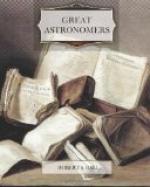It seems that at this epoch the finances of the Royal Society were at a very low ebb. This impecuniosity was due to the fact that a book by Willoughby, entitled “De Historia Piscium,” had been recently printed by the society at great expense. In fact, the coffers were so low that they had some difficulty in paying the salaries of their permanent officials. It appears that the public did not care about the history of fishes, or at all events the volume did not meet with the ready demand which was expected for it. Indeed, it has been recorded that when Halley had undertaken to measure the length of a degree of the earth’s surface, at the request of the Royal Society, it was ordered that his expenses be defrayed either in 50 pounds sterling, or in fifty books of fishes. Thus it happened that On June 2nd, the Council, after due consideration of ways and means in connection with the issue of the Principia, “ordered that Halley should undertake the business of looking after the book and printing it at his own charge,” which he engaged to do.
It was, as we have elsewhere mentioned, characteristic of Newton that he detested controversies, and he was, in fact, inclined to suppress the third book of the “Principia” altogether rather than have any conflict with Hooke with respect to the discoveries there enunciated. He also thought of changing the name of the work to De Motu Corporum Libri Duo, but upon second thoughts, he retained the original title, remarking, as he wrote to Halley, “It will help the sale of the book, which I ought not to diminish, now it is yours,” a sentence which shows conclusively, if further proof were necessary, that Halley had assumed the responsibility of its publication.
Halley spared no pains in pushing forward the publication of his illustrious friend’s great work, so that in the same year he was in a position to present a complete copy to King James II., with a proper discourse of his own. Halley also wrote a set of Latin hexameters in praise of Newton’s genius, which he printed at the beginning of the work. The last line of this specimen of Halley’s poetic muse may be thus rendered: “Nor mortals nearer may approach the gods.”
The intimate friendship between the two greatest astronomers of the time continued without interruption till the death of Newton. It has, indeed, been alleged that some serious cause of estrangement arose between them. There is, however, no satisfactory ground for this statement; indeed, it may be regarded as effectually disposed of by the fact that, in the year 1727, Halley took up the defence of his friend, and wrote two learned papers in support of Newton’s “System of Chronology,” which had been seriously attacked by a certain ecclesiastic. It is quite evident to any one who has studied these papers that Halley’s friendship for Newton was as ardent as ever.




